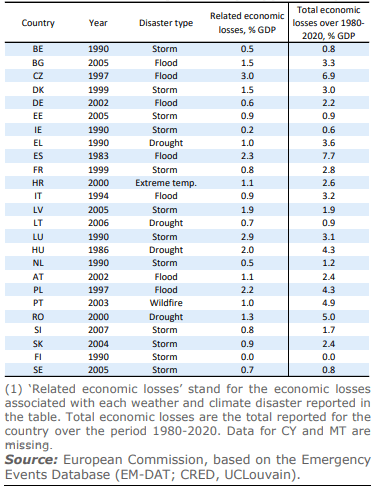The European Commission published a report identifying the economic losses due to weather and climate events in the European Union (EU).
Current available data indicate that, on average, the economic impact of weather and climate events should be contained.
During the period 1980-2020, economic losses accounted for a total of 3% of GDP in the EU. The average annual economic loss is less than 0.1% of GDP.
Although these figures do not (yet) seem significant from a macroeconomic point of view, they are also very likely to suffer from an underreporting of the real effects, as assessed in the report.
Selected major weather and climate-related disasters and associated economic losses, by country, type and year
Moreover, annual economic losses mask distributional impacts, with significant variations over time and between countries, depending on the occurrence of natural disasters.
Over the period 1980-2020, total economic losses ranged from almost 8% of GDP in Spain, 7% of GDP in the Czech Republic, 5% in Romania and Portugal, and less than 1% of GDP in the Netherlands, Estonia, Lithuania, Sweden, Belgium and Ireland.
Economic losses
The effect of natural disasters on overall economic losses has not been uniform over time, as quite often a single event has caused a significant share of the total reported economic losses.
In the EU, hydrological and meteorological events have caused most of the losses from weather and climate-related catastrophes.
The impact has even increased over the last 20 years, with weather and climate events accounting for a cumulative 50% of total reported economic losses from natural catastrophes, compared to 29% observed during the period 1980-1999.
According to the report, economic losses from natural disasters are expected to increase by at least two to three times in the EU by mid-century. By the end of the century, losses could multiply even more.
In particular, projections show that, compared to baseline climate conditions, economic losses are expected to be 1.9 times higher by mid-century if global warming were to be contained to the (more ambitious) Paris Agreement target (1.5 °C) by mid-century.
The impact would be 2.5 times greater with the 2°C target, over the same horizon.
![]()

